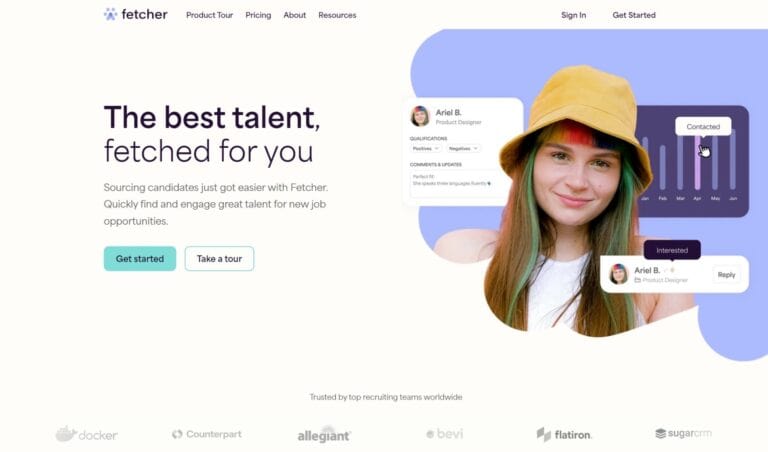Imagine losing your job to a technology you barely understand—a scenario that kept my client, a marketing manager, awake at night. Last month, her company replaced half of her team with AI-powered tools, leaving her scrambling to prove her value. Her story is not unique, underscoring the critical importance of understanding how to prepare for AI job market. As a careers coach with 19+ years of expertise, I’ve supported clients in turning AI from a threat into an opportunity by developing the right skills and strategies.
I hear you asking, “Why is preparing for the AI Job Market important?” It is vitally important because AI technologies are significantly changing how we work. These developments introduce fresh challenges and opportunities for workers across all fields. As more industries and businesses use AI systems, understanding how to use AI tools will be crucial for your career success. Let’s examine the essential skills and strategies that will help you prepare and succeed in this new work world.
Key Takeaways:
- Understand how AI is impacting your industry and the specific skills required to succeed.
- Develop a strong foundation of technical skills including digital literacy, data analysis, and AI-related tools.
- Cultivate your soft skills, in particular, creativity, problem-solving, and emotional intelligence to complement AI’s capabilities.
- Lifelong Learning is Essential. Stay updated with the latest AI trends and technologies. Invest in continuous learning and upskilling.
- Recognise AI as a Tool. Use AI to simplify tasks, increase productivity, and gain a competitive edge.
- Network and connect with industry professionals to stay informed and explore new opportunities.
- Future-proof your career. Proactively adapt to change, embrace new technologies, and position yourself as a valuable asset in the AI-driven workforce.
Understanding the AI-Driven Job Market

The job market is shifting fast because of AI technologies. The IMF predicts that Artificial Intelligence might affect up to 40% of jobs worldwide. In wealthier countries, this number could go up to 60%. About half of these positions might see harder times ahead (Source: World Economic Forum).
Some jobs (in fields such as banking and transportation) face bigger changes than others. Workers in these fields might face decreased wages, fewer job openings, and even job elimination.
COVID-19 made companies move faster to use AI. They started using digital systems for greater efficiency and remote work. Now, these changes have stuck around.
As AI develops, workers must adapt by increasing their technical skills and learning about new technologies. Integrating AI into the workforce is about more than automation. It is also about creating new jobs that use AI to work more productively.
How Does AI Technology Change Our Daily Work?
AI is significantly changing how we do our jobs and communicate at work. Many companies now use AI tools to handle basic, repetitive tasks. This lets staff spend time on higher-level problem-solving and creative endeavours.
To succeed at work, you need two key things. First, you must know how to use AI at work. Second, you must work well with AI to get more done. Understanding how AI thinks and works will help you advance in your job and career.
Preparing for the AI job market now makes sense. Workers who learn AI skills early will find it easier to fit in as jobs keep changing.
What is the Impact of AI on the Future Job Market?
The impact of AI on the future job market is huge. Roles involving routine tasks are at a higher risk of automation. On the other hand, jobs requiring complex problem-solving and creativity will likely thrive.
The Council of Economic Advisers highlights that Artificial Intelligence will push labour markets toward extremes. It will split jobs into two main groups. We’ll see more high-skill jobs with good pay. However, low-skill jobs with lower pay might become rare.
Therefore, you must develop new skills that work well with AI, ensuring you remain relevant in increasingly automated workplaces. For example, skills like data analysis and emotional intelligence will be vital for success in this new job market.
Is AI Taking Over Jobs or Creating New Opportunities?
AI might replace some jobs. But it also opens doors to new kinds of work. We’ve seen the following new jobs created by AI already:
- Smart home designer
- AI Auditor
- Data scientist or Data analyst
- AI product manager
- Cybersecurity
- AI customer experience specialist
- Prompt Engineer
- AI research scientist
- Machine Manager
- AI system maintenance
- AI for healthcare specialist
- Computer vision engineer
- AI ethics officer/AI Ethicists
- Robotics engineer
- AI Trainer
- And many other roles.
So, you should view AI as an opportunity for career growth, whether or not you are going into a direct AI career. Many businesses that use AI invest in training programs that develop employee skills. So take advantage of these opportunities if you can. If you recognise the potential for new job opportunities created by AI, you can prepare for tomorrow’s jobs by learning new skills today.
Essential AI Skills You Need for the AI Job Market

What AI-related Technical Skills Do You Need to Succeed in the Future of Work?
Only some people will be going directly into AI careers. Still, most jobs will need some know-how about AI tech. You don’t have to master all the tech skills mentioned below. However, learning some AI skills will help you succeed at work.
Essential Digital Skills for Everyone
Some digital skills are becoming as fundamental as basic computer literacy. These skills are the minimum technical know-how needed to thrive in almost any role.
1. Digital Literacy and Basic AI Interaction
The foundation of working in an AI-enhanced workplace starts with strong digital literacy. This includes the ability to:
- Efficiently use various digital tools and platforms
- Understand basic AI interfaces and how to use AI-powered software
- Adapt to new digital AI tools and platforms as they emerge
2. Data and Information Management
Many workplaces need their employees to handle and interpret data effectively, which requires these skills:
- Data visualisation: Creating clear, compelling visual representations of data to communicate insights effectively.
- Cybersecurity awareness: Knowledge of basic security practices to protect sensitive information, data and systems.
- Cloud computing: Understanding and working with cloud-based technologies and services for data storage and collaboration
3. AI-Enhanced Workflow Management
Success within some roles in the modern workplace also requires an understanding of:
- Automation and workflow optimisation: Familiarity with tools and techniques to simplify processes and improve efficiency.
- Agile methodologies: Familiarity with flexible, iterative project management and product development approaches.
- Collaborative intelligence: Understanding how to use AI tools and systems to augment human capabilities effectively.
Specialised Technical Skills for AI-adjacent Roles
Some roles will require a deeper technical understanding of AI systems and their implementation.
1. AI Systems and Architecture
Those working closely with AI implementation will require the following knowledge and skills:
- Machine learning literacy: A basic understanding of machine learning concepts and their applications in various industries.
- Basic AI model interpretation: The ability to understand and explain AI models’ outputs and decision-making processes to non-technical audiences.
- Natural language processing (NLP) awareness: Familiarity with how AI systems process and interact with human language.
- Robotic process automation (RPA): Knowledge of implementing and working alongside automated systems.
- API integration: Understanding how to connect software systems and AI services through application programming interfaces.
- Version control: Familiarity with tools like Git for managing and tracking changes in digital projects.
2. Emerging Technologies Integration
Knowledge and skills needed for roles involving cutting-edge technology include:
- Internet of Things (IoT) understanding: Awareness of how 5G connected devices and sensors can be used in various industries.
- Blockchain technology: Basic knowledge of distributed ledger technology and its potential applications.
- An understanding of advanced cloud computing architecture, complex systems integration, and how to implement them.
3. Technical Design and Implementation
For roles focused on user experience and system design, you need a range of skills and knowledge, including:
- User experience (UX) design: You must grasp the fundamentals of creating user-friendly interfaces and experiences for AI-powered products and services.
- Cross-functional communication: Effectively communicating technical concepts to non-technical team members and stakeholders.
- Ethical AI considerations: Awareness of the ethical implications of AI implementation and the ability to make responsible decisions.
- Systems architecture and integration planning
Building Technical Competency
Technical skills development should be:
- Progressive: Start with fundamental skills and build up to more complex ones.
- Role-appropriate: Focus on skills most relevant to your career path.
- Practical: Gain hands-on experience with real-world applications.
- Current: Stay updated with new AI technologies and best practices
By developing these skills strategically, you will be better equipped to work alongside AI technologies, leverage their capabilities, and remain competitive in the AI job market.
What Technical Skills Do You Need for an AI Occupation?
Gaining proficiency in programming languages (e.g. Python and R) is essential to pursue a career in AI. Skills in Machine learning (ML) and natural language processing (NLP) are particularly sought-after. These coding skills and tools enable professionals to build clever computer programmes (by creating new AI algorithms) that make AI better at its job.
A solid understanding of data analysis is equally crucial, as AI technologies heavily rely on data to function effectively. Workers who can analyse, interpret, and draw conclusions from large amounts of complex data will be in high demand across many sectors. In other words, those who can spot patterns in big piles of data are worth their weight in gold.
Many employers want these skills:
- Making sense of tricky data sets
- Finding useful bits in lots of numbers
- Seeing what the data means
- Using data to fix work problems
- Making smart choices based on facts
These abilities come in handy in lots of jobs. Doctors’ offices use them. Banks need them. Tech firms can’t work without them.
When you know how to work with data and use AI tools, you can solve more complex problems at work. This often leads to career advancement opportunities.
What Soft Skills Do You Need for the AI-Driven Job Market?
Tech skills matter, but soft skills such as creativity and emotional intelligence are becoming increasingly important. Being good with people matters even more as AI grows. Machines can crunch numbers but can’t read feelings or handle tricky conversations.
You will be a valuable asset to your organisation if you:
- Understand how others feel
- Work well in teams
- Come up with fresh ideas
- Solve problems in new ways
- Care about others’ needs
The human touch in customer service, negotiation, and leading teams will remain irreplaceable. Therefore, developing these soft skills is essential to succeeding in the AI job market.
Why are Problem-Solving Skills Essential in an AI Job Market?
Critical thinking and problem-solving skills help you work better with AI. You need to be able to spot when things don’t add up and fix them.
Some problems need a human brain, such as:
- Sorting out right from wrong
- Handling touchy situations
- Checking if AI is providing accurate information and makes sense
- Finding better ways to do things
If you can combine AI capabilities with real-world fixes, you will be valuable to your company. Other companies will also seek you out. Good problem-solvers spot chances to use AI in smart, new ways.
How are AI Tools Used at Work in Different Sectors?

AI tools are changing how we work in many fields. Using AI effectively can significantly enhance productivity and improve decision-making processes. Let’s look at how different jobs use AI to work better.
AI in Retail
Shops use AI to know what to stock and make buyers happy. AI can predict what people want to buy and when to order more.
AI in Manufacturing
In factories, AI predicts failures before they occur, allowing companies to schedule maintenance proactively. This saves time and money.
Additionally, AI-driven robotics improve assembly line efficiency by performing repetitive tasks precisely and quickly. As a result, humans are freed to focus on more complex responsibilities.
AI in Banking and Financial Services
Banks use AI to spot odd spending that might be fraud. They check money moves as they happen and flag anything strange.
AI-powered chatbots can also assist customers with questions and transactions, providing 24/7 support and improving overall customer satisfaction.
Further, banks use AI to advise on money that fits each person’s needs. The AI tool uses customer data to tailor recommendations and investment strategies.
AI in Health Care
Doctors use AI to spot illness faster and better. They feed patient details into AI systems that help them choose the best care. ML algorithms can process large amounts of medical data, enabling doctors to diagnose diseases more accurately and efficiently.
AI can also develop personalised treatment plans based on a patient’s genetic makeup and health history.
Further, AI helps with tedious office work. AI-powered systems can automate administrative tasks like scheduling appointments and managing patient records. This gives doctors and nurses more time with patients.
AI in Schools and Teaching
Teachers now use AI tools that change lessons to fit each student. If a student finds a lesson or concept hard, the AI gives extra help.
AI also helps teachers mark homework, track student progress, and perform administrative tasks. This lets teachers spend more time making fun lessons.
AI in Marketing
Predictive analytics can help marketers understand customer behaviour and preferences, allowing for more targeted advertising strategies.
AI content generation tools can also assist in creating personalised marketing materials.
Further, sentiment analysis tools can gauge public perception of brands in real time, enabling companies to respond swiftly to customer feedback.
How Can You Prepare Yourself for AI in the Workplace?

1. Being Prepared for Lifelong Learning
The work world keeps changing with AI. You must keep learning and developing your skills to stay competitive as technology develops.
Many workplaces will provide on-the-job training to help employees adapt to new technologies. However, you can also:
- Pursue formal education, such as AI certification programs
- Take specialised courses in data science
- Learn how AI helps your field
- Pick up new computer skills
Starting to learn now helps you stay ahead of industry changes and grab opportunities as they come. The more you know, the better you can use AI at work.
Unfortunately, we cannot always rely on formal education to keep pace. My analysis of missed AI opportunities in the updated Gatsby Benchmarks highlights how far behind current policy is on AI literacy. So whether you are a student transitioning from education to work or an employee who has been in work for years, we all need to take personal responsibility for our upskilling.
2. Being Adaptable and Open to Change
AI brings quick changes to job roles and responsibilities. Being quick to adjust and adapt to change will help you succeed.
Smart workers:
- Try new ways of working
- Learn new AI skills
- Stay informed about what’s new in their field
- Say yes to fresh ideas
If you can pivot quickly, you will thrive in workplaces employing AI. Adaptability allows you to embrace the integration of AI technologies, increasing your value within the labour market.
3. Embracing AI in Career Path Development
Openness to AI technologies can significantly enrich your career development. Adding AI know-how to your skills makes you stand out. It allows you to position yourself as a leader in your field, driving innovation and efficiency.
Knowing AI helps you:
- Spot ways to improve work (e.g. business processes)
- Fix problems better
- Keep your job safe
- Receive promotions
This proactive approach prepares you for job roles utilising AI. It also equips you with the necessary AI skills employers increasingly seek in the future job market.
4. Consider Pursuing a Career in AI
Pursuing a role in AI can be a strategic move for those looking to future-proof their careers. Whether you are a young person considering your career options or a person considering transitioning to a new career in AI, this could be a good option for you.
The demand for AI specialists is rising, with opportunities in machine learning, data analysis, and AI ethics. If interested in this career pathway, learn how to get into AI, including the education and training requirements.
As companies become more dependent on AI technologies, the demand for qualified experts to design, execute, and oversee these systems will grow. You could help shape how we all work with AI.
How Can You Future-proof Your Career Against Job Displacement in the AI Job Market?

Future-proofing your career against displacement requires a proactive approach to skill development and career planning. Being adaptable and knowledgeable can mitigate the risks of job displacement resulting from AI advancements. You can future-proof your career against job displacement in four ways.
1. Develop AI Skills to Boost Your Chances of Career Advancement
AI skills can help you climb the career ladder faster. When you know how to work with AI, you stand out. Bosses notice workers who can solve problems with AI. This might mean:
- Learning basic coding
- Understanding how AI works
- Seeing where AI can help your team
- Trying new AI tools at work
The more you learn about AI, the more chances you’ll get. Some companies might even pay for your training.
2. Identifying New Skills Needed in the Changing Job Market
Identifying new skills that align with AI advancements is crucial for career growth. You must keep updated with industry trends and emerging technologies to determine which skills will be in demand.
You can stay ahead in the AI job market by:
- Reading tech magazines and blogs
- Following AI news online
- Talking to people in your industry
- Taking short online courses
- Watching what new tools people use
Don’t just learn one thing. Be ready to learn lots of different skills.
Checking your skills often helps you:
- See what you need to learn
- Find gaps in your knowledge
- Stay useful at work
- Feel confident about your future.
You’ll do well as AI grows by staying curious and open to learning. Continuous learning allows you to prepare for the future and adapt to changes in the workplace.
3. Networking and Staying Informed About AI Trends
Networking is a valuable way to stay current on AI trends and opportunities in the job market. Making professional connections in the tech world helps you learn about AI faster. Good networks can open doors to new chances and insights.
Smart ways to connect with industry professionals include:
- Going to tech talks, workshops and conferences
- Join online AI groups and forums
- Follow AI experts, thought leaders, and organisations in the AI field on social media
- Chat with colleagues about new tech
- Attend local tech meetups
Connecting with peers and mentors can result in valuable networks and job opportunities. Additionally, you can stay updated on emerging technologies and best practices.
By developing a robust professional network, you can enhance your understanding of AI’s impact on the job market and gain insights into potential career paths.
The more you know and connect, the better prepared you’ll be. AI moves fast, and talking to others helps you keep up to date on all the changes.
4. Utilising Online Resources and AI Training Programs
Online resources and training programs offer valuable opportunities for upskilling in AI. Many institutions offer certification courses covering essential AI concepts and applications, making it easier for individuals to expand their knowledge and skills.
Platforms like Coursera, edX, and Udacity offer courses customised for various skill levels, from beginner to advanced. They also offer free trials so you can begin developing your skills immediately. Experiment with tutorials and projects to see which areas of AI spark your passion.
These resources can inform you about the latest AI developments and improve your employability. Start learning today by enrolling in AI and machine learning courses such as “Generative AI for Software Development.“
Conclusion: How to Prepare for AI Job Market
The AI job market presents both tremendous challenges and outstanding opportunities for you as a forward-thinking professional. Knowing how to prepare for the AI job market is critical—and it starts with a bold, proactive approach. By embracing continuous learning, strategic skill development, curiosity, and adaptability, you can turn this period of change into a springboard for success.
Your success in the AI-driven workplace depends on three key strategies:
- Mastering technical skills to stay ahead of innovation
- Nurturing soft skills to collaborate effectively in AI-powered environments
- Maintaining a growth mindset to adapt with confidence
These strategies matter because they empower you to take control of your future instead of feeling overwhelmed by uncertainty. By taking bold steps now, you can replace frustration and apprehension with confidence and clarity.
What’s your next step? Start today:
- Learn how to use one new AI tool at work or develop an AI skill.
- Explore online resources to accelerate your learning.
- Build connections with professionals in your field who can inspire your journey.
The time to act is now. Bookmark brianvanderwaal.com and sign up for my newsletter for expert advice, tailored tools, and inspiration to unlock your full potential in the dynamic, AI-driven job market. Let’s create your success story together!







